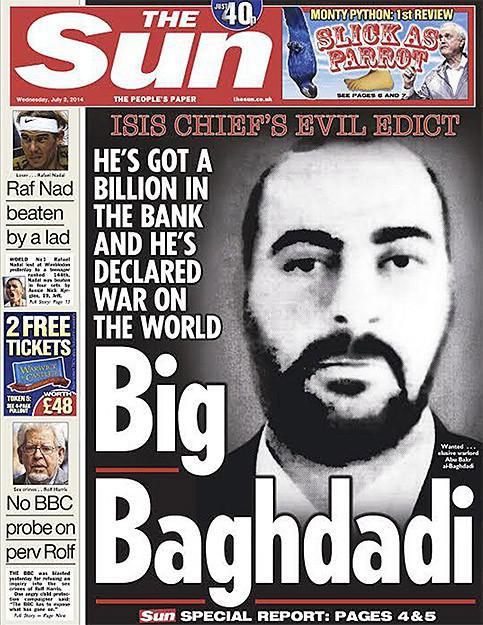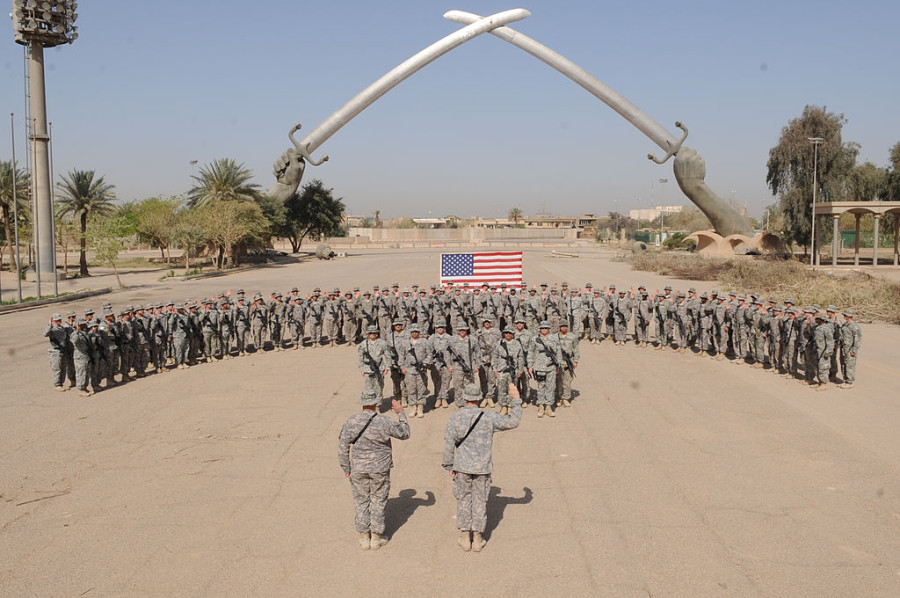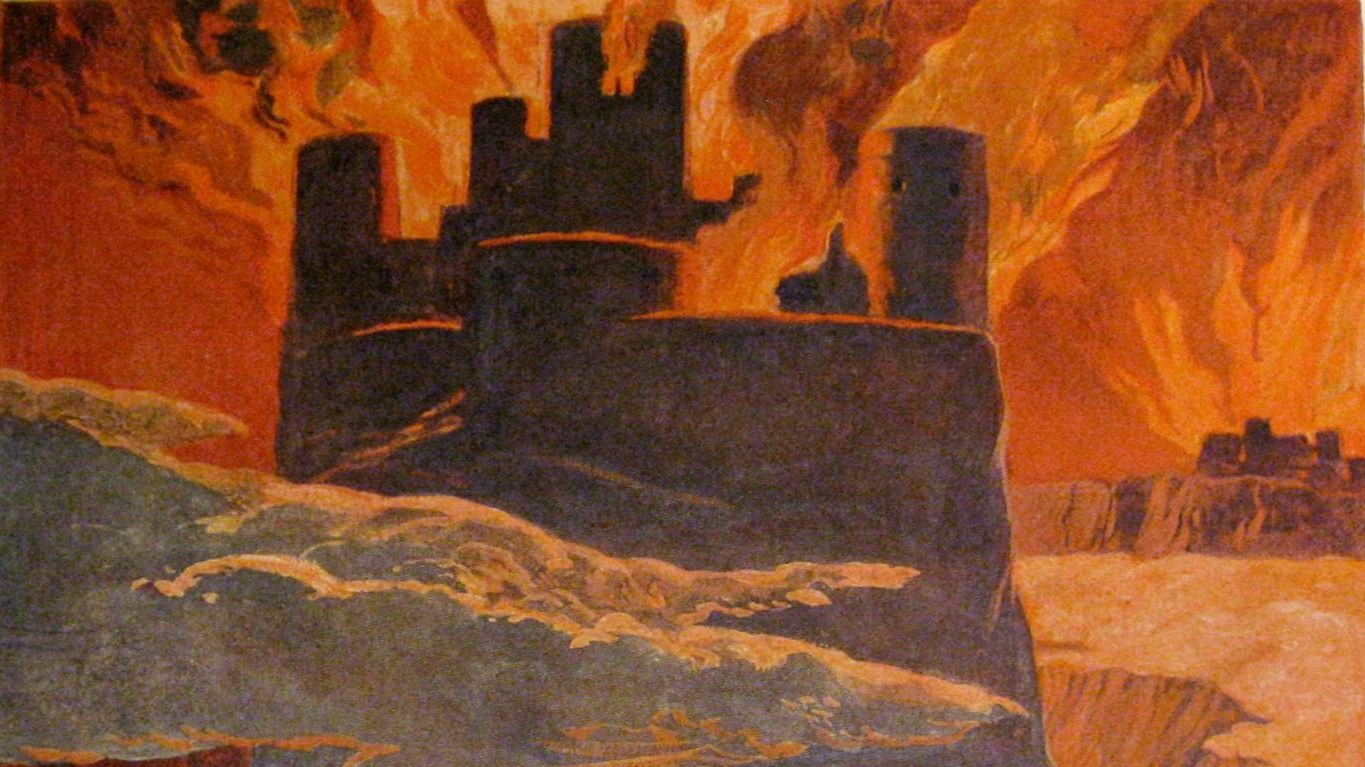The Islamic state (Organization banned in Russia) is being quick in creating an image of enemy necessary to waging the war, as well. In the fall of 2014, the main objects of ISIL (Organization banned in Russia) attention, Russia and Syria, were determined.
In the previous article we raised the question of how exactly ISIL (Organization banned in Russia) (or “Islamic state” (Organization banned in Russia)) functions, what their goals and objectives are. This question requires ever-greater certainty.
Today it is not enough to say that on the territory claimed by the armed insurgents (i.e., in Iraq and Syria) a Caliphatist quasi-state formation is being created.
Nor is it enough to emphasize that ISIL (Organization banned in Russia) today is a theocratic quasi-state, which is urgently creating all its life support systems (management, financial bodies, power structures, legislative, judicial and executive branches of power, taxation system).
We also need to establish that this quasi-state formation has declared its main goal to be the creation of a new Caliphate on the vast territories from Africa to India. And this is what determines the desire of ISIL (Organization banned in Russia) for broad expansion based on rapid institutional development and financial strengthening.
But even such definitions are currently not enough.
Today we need a clear understanding that the current Islamic state (Organization banned in Russia), irreconcilably hostile to the outside world, is the result and, at the same time, the fruit of many years of activity, of building and expansion of various Islamist groups and projects in the huge Muslim world. That this entails all the Islamist associations that have been active in the Muslim world after the destruction of the Soviet Union; each of which, in turn, was the next step in preparation for the future emergence of this new Caliphatist army. Among such associations, there are Taliban, al-Qaeda (Organization banned in Russia), militants of Central Asia, radical groups in Syria, the Caucasus separatists, and the Mujahideen all across the Islamic world. And virtually all of them received support from Western intelligence agencies on some stage of their development. And the Muslim Brotherhood (Organization banned in Russia), which are lukewarm towards ISIL (Organization banned in Russia), are too weakened by their political defeat in Egypt to have a strong impact on the whole Jihadist community now.
Finally, it follows from the above that the “Islamic State” (Organization banned in Russia) claims to be a radical Islamic integrator that needs to bring together hotbeds of radicalism scattered across countries and regions into a huge ultra-radical territory that has not been about for many centuries. Are the forces of ISIL (Organization banned in Russia) up to such a task?
Maria Podkopaeva
Today, the effectiveness of ISIL (Organization banned in Russia) that astonishes the world community is determined by a combination of a number of factors of varying importance. These include:
1. The most efficient part of the “opposition” in Syria, previously trained by American, British and French instructors, joining ISIL (Organization banned in Russia).
2. The incorporation of the senior officers of Saddam Hussein’s Iraqi army, members of the Ba’ath party and the Iraqi Sufi Order Jaysh Rijal al-Tariqa al-Naqshbandia into the ranks of ISIL (Organization banned in Russia). This incorporation made it possible to mobilize and to use their experience of strategic planning, institutionaliza
The top leadership of ISIL (Organization banned in Russia) has been made up of former military officers of Saddam Hussein’s army. Among them, a former colonel of the Iraqi air defense force Abu Ayman al-Iraqi who has become a key figure of ISIL (Organization banned in Russia). There we also find Abu Ahmad al-Alwani, one of the four members of ISIL (Organization banned in Russia) Military Council, who used to serve in the Iraqi army. Another key figure was Haji Bakr (his real name was Samir Abd Muhammad al-Khlifawi), a former officer of the Iraqi army. And in this list there is an iconic figure of 72-year-old General Izzat Ibrahim al-Douri, a member of the Ba’ath party since 1958, at one point he was Saddam Hussein’s deputy as the Chairman of the Iraqi Revolutionary Command Council and Ba’ath Secretary, he was also the head of the Sufi Jaysh Rijal al-Tariqa al-Naqshbandia in Iraq.
3. The widespread use of electronic media for recruiting Islamists from all over the world into their ranks. ISIL (Organization banned in Russia) activity in social networks is growing rapidly. The militants actively share photos and videos of executions and massacres. They already made their own app for the Android platform, an operating system for a wide list of electronic devices. For the purpose of attracting football fans to the ideology of the ISIL (Organization banned in Russia) they “stole” popular Twitter hashtags: #WorldCup and #Brazil2014. Now, clicking on them, football fans can receive instant information about the “Islamic State” (Organization banned in Russia). And there are lots of other examples of this kind.
Together such actions give tangible results. There are now about one and a half thousand citizens of the USA, 900 French and 400 German citizens and more than 1500 British subjects, several thousand immigrants from the CIS countries — Russia, Azerbaijan, Georgia, Kazakhstan, Kyrgyzstan, Tajikistan, Turkmenistan, Uzbekistan fighting on the side of ISIL (Organization banned in Russia). It is worth mentioning that foreigners are fighting in the “national” units, not mixing with other units (which means that these whole units are receiving combat experience to go back to their native countries and attack the citizens of these countries together, as a combat unit – Editor).
4. The most important component is the financial independence. It is based on the seizing of assets and the largest oil fields, antiquities trade and slave trade. Already today respectable American media call the Islamic state (Organization banned in Russia) the richest jihadist group in the world.
5. One of the main conditions of success of ISIL (Organization banned in Russia) are the weapons, ammunition and military equipment worth billions of dollars seized in Iraq.
In addition to all of this, we must not forget that the origin of ISIL (Organization banned in Russia) is closely linked to al-Qaeda (Organization banned in Russia). And that integration prospects of the Islamic state (Organization banned in Russia) are primarily based on the fact that in some countries during the “Arab spring” hotbeds of al-Qaeda (Organization banned in Russia) radicalism were created. These include Syria, Libya, Mali, and Niger. Now these are practically ready-made fragments for integration into the so-called new Caliphate. And the “Islamic state” (Organization banned in Russia) is already working in this direction.
Declaring himself the Caliph of all Muslims, Abu Bakr al-Baghdadi immediately called on Muslims worldwide to swear allegiance to him. Islamists in Libya, Algeria and Afghanistan have responded to the call, and those in Yemen and Nigeria have expressed their support to ISIL (Organization banned in Russia).

The Islamic state (Organization banned in Russia) is being quick in creating an image of enemy necessary to waging the war, as well. In the fall of 2014, the main objects of ISIL (Organization banned in Russia) attention were determined: Russia and Syria.
On September 3, 2014 (one year before the start of Russian air operation in Syria – Editor) they published a video with subtitles in Russian: ‘This message is addressed to you, oh Vladimir Putin. These are your aircraft, which you sent to Bashar, and with the help of Allah we will send them back to you. Remember this. And with the permission of Allah we will liberate Chechnya and all the Caucasus. The Islamic State [Organization banned in Russia – Editor] exists and it will exist and it will expand with the help of Allah. Your throne is already shaking. It is in danger and it will collapse when we get to you. We are on the way with Allah’s permission.’
A month later, on October 9, Bloomberg published an intercepted telephone conversation of one of the military leaders of ISIL (Organization banned in Russia) — Umar al-Shishani (Tarkhan Batirashvili, a native of the Pankisi Gorge in Georgia) with his father, to whom he promised: “Thousands are ready to follow me, I will gather more people and we will take revenge on Russia“. Al-Shishani was referring to revenge for the defeat of the Georgian troops which attacked South Ossetia in 2008.
Such public speeches are the part of ISIL (Organization banned in Russia) “human resource” policy, which includes actively promoting immigrants from the CIS countries to leadership positions. It has been repeatedly noted that Umar al-Shishani has become a de facto media person — the ‘face’ of ISIL (Organization banned in Russia). In addition, Abu Bakr al-Baghdadi personally appointed a native of Tajikistan Abu Abdulrahman Tajiki, the Emir of the militants of the city of al-Tabqa in the Syrian province Ar-Raqqa.
Furthermore, now ISIL (Organization banned in Russia) pays special attention to Central Asia and the Afghanistan-Paki
In the summer of 2014, presidential elections were held in Afghanistan. Leaders of the election race won approximately equal number of votes (Ashraf Ghani Ahmadzai — 56,44 %, Abdullah Abdullah — 43,56 %) and signed the agreement to share the political power. In this situation of the actual paralysis of power, the problem of the possible growing influence not only of the Taliban, but of the Islamic state (Organization banned in Russia) in the region has been most acute.
In August ISIL (Organization banned in Russia) leaflets appeared in Afghanistan. They were distributed from the Afghan Peshawar and were sent, among other places, to the tribal areas of the Pakistani territory.
According to some sources, first base of the Islamic State (Organization banned in Russia) has already been created in Afghanistan, and hundreds of ISIL (Organization banned in Russia) militants are on their way there. This could only mean preparation for specific [military] actions.
Among the Pakistani Taliban there are substantive differences on the issue of support for ISIL (Organization banned in Russia). However, a number of commanders and high-status members of the Pakistani Taliban pledged allegiance to the Islamic State (Organization banned in Russia). Among them, we find the spokesman of Tehreek-i-Taliba
But the Islamists of Central Asian origin did not stay away from this nascent consolidation around ISIL (Organization banned in Russia).
The radical Islamic Movement of Uzbekistan (IMU), for a long time closely associated with the Taliban and the Pakistani Inter-Services Intelligences (ISI), at the end of September, too, pledged allegiance to ISIL (Organization banned in Russia). This was stated by the IMU leader Usman Ghazi “on behalf of all members of our movement, in line with our sacred duties, I declare that we are in the same ranks with the Islamic State [Organization banned in Russia – Editor] in this continued war between Islam and [non-Muslims]”. He welcomed the Islamic State (Organization banned in Russia) and wished ISIL (Organization banned in Russia) to soon capture Mecca, Medina, and the Palestinian territories.
What do we make of these pledges to ISIL (Organization banned in Russia) from the African groups, on the one hand, and the groups in the countries of Central Asia, on the other hand? As well as with the threat of the Islamic state (Organization banned in Russia) to “deal with” the Caucasus and Russia? Overall, the situation resembles the state of affairs in Europe at the beginning of the Second World War. At the time, the Western countries held intensive discussions about what direction of the attack would be pivotal to Nazi Germany — East or West. The result of this diplomacy, among other factors, was that the Nazi war machine turned east and the Great Patriotic War began.

With all due limitations, there are apparent similarities between the current situation and what happened back then. From this point of view, the threat of ISIL (Organization banned in Russia) Islamists to initiate activities in the Caucasus, ISIL (Organization banned in Russia) base in Afghanistan, the pledge of allegiance of the Taliban and Uzbek Islamists to ISIL (Organization banned in Russia) are all part of the preparation to attack China (the East) and Russia (the North). The latter option is, apparently, preferable to the USA. And the airstrikes of ISIL (Organization banned in Russia) positions in Iraq or Syria will have an effect similar to the one that the fire on cities and villages of Donbass by the Ukrainian army had — the displacement of huge numbers of people outside the country. Only in the case of ISIL (Organization banned in Russia) it will be armed men (to solve this problem, one had to coordinate the airstrikes with the Syrian forces on the ground. The U.S.-led coalition refused to recognize the Syrian government and its forces, and reserved to airstrikes alone, causing the situation described above. Russia coordinates its airstrikes with the Syrian forces on the ground, causing the steadily approaching defeat of ISIL (Organization banned in Russia) – Editor).
With each passing day, it becomes increasingly clear that the boiling “great Islamic pot” is brewing an aggressive substance, able in some way to spill over to almost all regions of the world. So far, the Western coalition sets in front of it flimsy barriers in the form of airstrikes. And the Eastern one? Will there be such a coalition? What strategy will it be looking for? And in what time frame?
Source (for copy): https://eu.eot.su/?p=5813
This is the translation of an article (first published in “Essence of Time” newspaper issue 101 on October 29, 2014) by Timur Urazov of a series on rebuilding of Middle East and Africa by the West. This rebuilding was launched to give rise to the most violent and bloody regime, such as ISIL (Organization banned in Russia) “caliphate”, which is supposed to eventually attack and conquer Russia, China and Europe.




